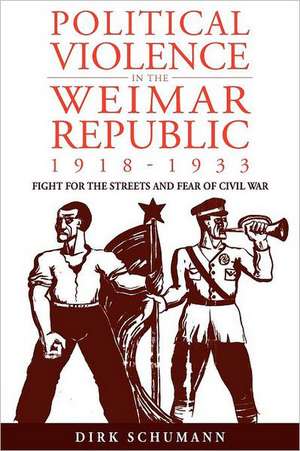Political Violence in the Weimar Republic, 1918-1933: Studies in German History, cartea 10
Autor Dirk Schumannen Limba Engleză Paperback – 31 mar 2012
In his exceptional regional study of the Prussian province of Saxony, Schumann offers a richly detailed analysis of political violence in the Weimar Republic...This is a wordy but methodical and ultimately convincing work of scholarship. Choice
Schumann ... calls into question some assumptions, provides interesting nuances, and helps to refine our understanding of the nature of political violence in Weimar Germany. Journal of Modern History
... provides a well-documented, solid narrative and challenging analysis of Weimar's political violence... American Historical Review
[This] definitive work, rich in source material and analysis, dispels stereotypes of political violence in the Weimar Republic. Historische Zeitschrift
The Prussian province of Saxony-where the Communist uprising of March 1921 took place and two Combat Leagues (Wehrverbände) were founded (the right-wing Stahlhelm and the Social Democratic Reichsbanner) - is widely recognized as a politically important region in this period of German history. Using a case study of this socially diverse province, this book provides a comprehensive analysis of political violence in Weimar Germany with particular emphasis on the political culture from which it emerged. It refutes both the claim that the Bolshevik revolution was the prime cause of violence, and the argument that the First World War's all-encompassing "brutalization" doomed post-1918 German political life from the very beginning. The study thus contributes to a view of the Weimar Republic as a state in severe crisis but with alternatives to the Nazi takeover.
Dirk Schumann is Professor of History at Georg-August University, Göttingen. He is the co-editor of Life After Death (2003), Violence and Society after the First World War (first issue of Journal of Modern European History [2003]), Between Mass Death and Individual Loss (2007). Most recently, he has edited Raising Citizens in the "Century of the Child": The United States and German Central Europe in Comparative Perspective (2010).
Din seria Studies in German History
- 16%
 Preț: 584.00 lei
Preț: 584.00 lei - 25%
 Preț: 522.99 lei
Preț: 522.99 lei - 25%
 Preț: 582.93 lei
Preț: 582.93 lei - 14%
 Preț: 920.75 lei
Preț: 920.75 lei - 19%
 Preț: 497.19 lei
Preț: 497.19 lei - 14%
 Preț: 691.65 lei
Preț: 691.65 lei - 17%
 Preț: 581.72 lei
Preț: 581.72 lei - 25%
 Preț: 516.71 lei
Preț: 516.71 lei - 9%
 Preț: 249.75 lei
Preț: 249.75 lei -
 Preț: 225.10 lei
Preț: 225.10 lei - 13%
 Preț: 645.95 lei
Preț: 645.95 lei - 28%
 Preț: 474.21 lei
Preț: 474.21 lei - 14%
 Preț: 690.87 lei
Preț: 690.87 lei - 23%
 Preț: 748.38 lei
Preț: 748.38 lei -
 Preț: 301.38 lei
Preț: 301.38 lei -
 Preț: 154.49 lei
Preț: 154.49 lei -
 Preț: 301.00 lei
Preț: 301.00 lei - 15%
 Preț: 577.08 lei
Preț: 577.08 lei - 23%
 Preț: 749.64 lei
Preț: 749.64 lei - 23%
 Preț: 753.11 lei
Preț: 753.11 lei - 23%
 Preț: 750.76 lei
Preț: 750.76 lei - 23%
 Preț: 751.25 lei
Preț: 751.25 lei - 17%
 Preț: 582.61 lei
Preț: 582.61 lei - 12%
 Preț: 617.12 lei
Preț: 617.12 lei - 26%
 Preț: 559.65 lei
Preț: 559.65 lei - 23%
 Preț: 744.71 lei
Preț: 744.71 lei - 23%
 Preț: 836.65 lei
Preț: 836.65 lei - 23%
 Preț: 753.18 lei
Preț: 753.18 lei -
 Preț: 260.19 lei
Preț: 260.19 lei - 23%
 Preț: 749.91 lei
Preț: 749.91 lei - 23%
 Preț: 749.32 lei
Preț: 749.32 lei -
 Preț: 258.66 lei
Preț: 258.66 lei -
 Preț: 533.14 lei
Preț: 533.14 lei - 23%
 Preț: 750.08 lei
Preț: 750.08 lei - 23%
 Preț: 835.31 lei
Preț: 835.31 lei - 23%
 Preț: 806.85 lei
Preț: 806.85 lei - 23%
 Preț: 749.77 lei
Preț: 749.77 lei -
 Preț: 264.82 lei
Preț: 264.82 lei - 23%
 Preț: 1002.27 lei
Preț: 1002.27 lei -
 Preț: 258.50 lei
Preț: 258.50 lei - 23%
 Preț: 749.32 lei
Preț: 749.32 lei -
 Preț: 264.26 lei
Preț: 264.26 lei -
 Preț: 261.93 lei
Preț: 261.93 lei - 23%
 Preț: 750.49 lei
Preț: 750.49 lei - 30%
 Preț: 505.06 lei
Preț: 505.06 lei
Preț: 189.89 lei
Nou
Puncte Express: 285
Preț estimativ în valută:
36.34€ • 37.80$ • 30.00£
36.34€ • 37.80$ • 30.00£
Carte disponibilă
Livrare economică 24 martie-07 aprilie
Preluare comenzi: 021 569.72.76
Specificații
ISBN-13: 9780857453143
ISBN-10: 0857453149
Pagini: 398
Dimensiuni: 152 x 229 x 21 mm
Greutate: 0.53 kg
Editura: BERGHAHN BOOKS INC
Seria Studies in German History
ISBN-10: 0857453149
Pagini: 398
Dimensiuni: 152 x 229 x 21 mm
Greutate: 0.53 kg
Editura: BERGHAHN BOOKS INC
Seria Studies in German History
Notă biografică
Dirk Schumann is Professor of History at Georg-August University, Gottingen. He is the co-editor of Life After Death (2003), Violence and Society after the First World War (first issue of Journal of Modern European History [2003]), Between Mass Death and Individual Loss (2007). Most recently, he has edited Raising Citizens in the "Century of the Child". The United States and German Central Europe in Comparative Perspective (2010).
Cuprins
Preface List of Illustrations and Tables List of Abbreviations Note on the administrative structure of Prussia Introduction PART I: THE CIRCUMSCRIBED CIVIL WAR 1919-1921 Chapter 1. Radicalization and Violence 1919 Chapter 2. New Mistrust, Old Enemies: The Massive Experience of Violence during the Kapp Putsch of 1920 and its Aftermath Chapter 3. Preventive Offense and Improvised Uprising: the "March Action" of the Prussian Government and the Communists 1921 PART II: SYMBOLIC FIGHTING AND THE STRUGGLE FOR TERRITORY 1921-1923 Chapter 4. The Political Murders of 1921/1922 and their Consequences in the Province of Saxony Chapter 5. The Catastrophe that did not Happen: Food Protests and Political Violence under Hyperinflation 1922/1923 PART III: YEARS OF CALM? POLITICAL VIOLENCE 1924-1929 Chapter 6. The Rise of the Combat Leagues (Wehrverbande) Chapter 7. The Continuity of Violence Chapter 8. A Parade of Men. Violence in the Political Culture PART IV: THE ESCALATION OF VIOLENCE: 1929/30-1933 Chapter 9. The Rise of the Nazi Movement and the Persistent Weakness of the Communists Chapter 10. Escalation without Limits? Political Violence in the Final Phase of the Weimar Republic Chapter 11. Misjudgment, Downplaying, Approval: Interpretations of Political Violence 1930-1933 Conclusion: Political Violence and the Weimar Republic's Chances of Survival Bibliography Subject Index Index of People and Places
Recenzii
"In noting that political violence was the product of choices made by political actors rather than the result of irresistible forces - Schumann issues a pertinent warning while making a first-rate contribution to the scholarly literature on the Weimar Republic." * Central European History "[A[ well-documented and skillfully argued book." * German Studies Review "In his exceptional regional study of the Prussian province of Saxony, Schumann offers a richly detailed analysis of political violence in the Weimar Republic - This is a wordy but methodical and ultimately convincing work of scholarship." * Choice "Schumann ... calls into question some assumptions, provides interesting nuances, and helps to refine our understanding of the nature of political violence in Weimar Germany." * Journal of Modern History " - provides a well-documented, solid narrative and challenging analysis of Weimar's political violence - " * American Historical Review "[This] definitive work, rich in source material and analysis, dispels stereotypes of political violence in the Weimar Republic." * Historische Zeitschrift







